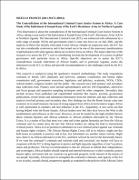| dc.description.abstract | OKELLO FRANCIS (2011-M172-20014)
The Contradictions of the International Criminal Court Justice System in Africa: A Case Study of the Indictment of Joseph Kony of the Lord’s Resistance Army in Northern Uganda.
This dissertation is about the contradictions of the International Criminal Court Justice System in Africa, taking a case study of the Indictment of Joseph Kony of the Lord‟s Resistance Army (LRA) in Northern Uganda. The International Criminal Court (ICC) was embraced with enthusiasm by a wide range of people, NGOs and government when it came into force on 1st July 2002, and the majority of those who initially welcomed it were African. Despite an auspicious start, the ICC has run into considerable controversy and it has turned out to be one of the unsavoury manifestations of globalisation with what appears almost an exclusive focus on Africa. The major objective of the research is to assess the ICC‟s role in contributing towards the development of a system of global governance with particular focus to Africa. Specific objectives are to assess the ICC‟s contradictions towards indictment of African leaders and in particular Uganda; assess the alternatives to the ICC in Africa and provide recommendations to the challenges faced by the ICC in Africa.
This research is analytical using the qualitative research methodology. The study respondents consisted of former LRA abductees and survivors, amnesty commission and human rights commission staff, government executives, legislators and judiciary, academia, NGOs, CSOs, cultural leaders, religious leaders and the public. The research uses both primary and secondary data collection tools. Primary tools include questionnaires used for 100 respondents, interviews and focus groups and purposive sampling techniques used for other categories. Secondary data include reviews from published and unpublished materials like reports, journals, government publications, recent books and substantial information from the internet; and data collection and analysis involved primary and secondary data. Key findings are that the Rome Statute came into existence in no small measure, because of strong support from Africa in its formative stages. Africa is well represented in numbers and real influence at the ICC. Apparently, it now turns out that having helped write the Rome Statute, African leaders now feel they have lost to the West in the establishment and influence at the Court. However, do not be misled by the high-minded rhetoric about colonial injustice and African solutions to African problems advocated by the African Union. It is a matter of fact that most war crime and crime against humanity are from the African continent and we cannot deny the fact that African leaders are taking the lead in international criminal justice. Africa is in no position to administer its own criminal justice against war criminals and human rights violators. The African Human Rights Court, still in its infancy, might one day hold states accountable in practice and in law, but individuals are another matter entirely. Right now, there is no African alternative to the ICC, and there will not be one for the foreseeable future. If we want the continent‟s criminals and warlords tried and convicted, our leaders will have to cooperate with the ICC to bring fugitives to justice and fight impunity regardless of one‟s position, status and profession. The key recommendation is that for Africans to defend their independence and sovereignty, African leaders should respond and entrench democracy in their countries, protect human rights, and ensure that our countries are governed properly, in the interest of the masses of our people. Secondly, Africans have to strengthen the continent's cohesion, and capacity of the AU to act in unity, around a broad, progressive agenda as contained in the policies of the African Union
and OAU. Finally, Africa needs to strengthen its capacity and ensure that African‟s voices are heard and treated with seriousness in handling her affairs. Africans must also strengthen the links between Africa and other developing countries to enhance its own ability to impact on the contemporary global affairs through mobilisation and activation of the forces on the continent.
Key Words: Contradictions, International Criminal Court Justice System, Africa, Indictment, Joseph Kony, Lord’s Resistance Army, Northern Uganda. | en_US |


